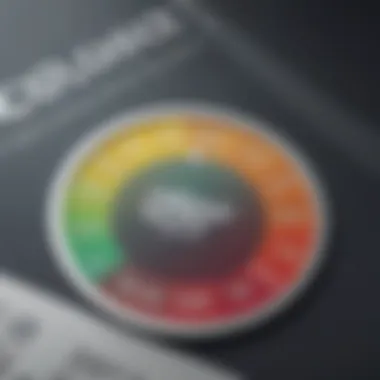Exploring the Pros and Cons of Debt Settlement


Intro
When individuals find themselves deep in the throes of debt, the pathway to financial recovery can appear foggy at best. Settling debt presents itself as one potential lifeline amid the often turbulent seas of financial strain. Capturing the essence of this journey means appreciating both its allure and hazards. This examination delves into the implications of debt settlement, aiming to provide a well-rounded perspective.
Understanding what debt settlement entails is the first step. Many people think of it as a straightforward way to cut past due amounts and come out with a fresh start. However, this approach can come with its own bag of complications, especially regarding the impact on credit scores and overall mental health. By exploring these many facets, we can better guide ourselves through the maze of options sprouting from financial disarray.
Investment Dictionary
In the context of this discussion, having a firm grasp of key terminology is essential. This section aims to break down some crucial terms, ensuring clarity as we navigate through the nuanced landscape of debt management.
Key Terminology Breakdown
- Debt Settlement: This is the process where a debtor negotiates with creditors to reduce the total amount owed. It's often pursued as a way to mitigate overwhelming financial burdens.
- Creditor: An individual or institution to whom money is owed. Understanding who the creditors are can play a crucial role in the negotiation process.
- Credit Score: A numerical representation of a person's creditworthiness, which can be significantly affected by debt settlement.
- Debt Recovery: This term refers to the collection of past-due accounts, which can affect both the creditor’s and debtor's financial standing.
Understanding these terms is fundamental for anyone considering the debt settlement route.
Weighing Benefits and Drawbacks
As we examine the terrain of debt settlement, it is imperative to assess the advantages and disadvantages.
Benefits
- Reduced Debt Volume: One of the most immediate advantages is the potential for substantial reductions in the total debt owed, which can lead to a more manageable financial situation.
- Negotiation Power: Many creditors may prefer to settle rather than pursue tedious collection processes, giving individuals leverage in negotiations.
- Emotional Relief: For many, settling debts can lift a heavy psychological burden, allowing them to focus on rebuilding their lives.
Drawbacks
- Impact on Credit Scores: A significant drawback is the potential drop in credit scores, which can have long-lasting implications for future financial endeavors.
- Potential Tax Consequences: Sometimes, forgiven debt may be considered taxable income, adding another layer of complexity to the settlement.
- Not a Guaranteed Solution: There's no guarantee that negotiations will yield favorable terms, and some individuals may end up feeling worse off than before.
An understanding of both benefits and downsides creates a clearer picture and enables a more informed decision-making process.
“Debt settlement is not just a quick fix; it can profoundly impact future financial opportunities.”
Closure
Navigating the waters of debt, especially when considering settlement, calls for both insight and caution. Weighing up the potential benefits against the drawbacks is key to a balanced decision. Much like choosing an investment, one must consider not just the immediate gains but also the long-term repercussions. In this ongoing financial saga, knowledge truly is power. With informed consideration, individuals can embark on this journey equipped to face whatever comes their way.
Understanding Debt Settlement
Debt settlement is a crucial topic for individuals facing significant financial challenges. As people accumulate debts from various sources—be it credit cards, personal loans, or medical expenses—the path to financial stability can often seem daunting. Understanding debt settlement can provide a viable option for those struggling to keep up with their payments. This process involves negotiating with creditors to reduce the total amounts owed, potentially resulting in substantial financial relief.
Central to grasping debt settlement is recognizing its implications. It’s not merely a quick fix; it can influence one's financial future for years to come. The main goal is to alleviate the burden of existing debts, thus creating opportunities for improved cash flow. However, before jumping into such a plan, individuals must carefully assess its effects on credit scores and overall financial health. The complexity of each financial situation demands that one weigh the benefits and drawbacks meticulously.
A clear acknowledgment of the mechanisms behind debt settlement will provide a foundation for making informed decisions.
What is Debt Settlement?
Debt settlement is essentially an agreement between a debtor and creditors to resolve debts for less than the amount owed. This solution is typically pursued by individuals who find themselves unable to make the required payments, leading them to negotiate more favorable terms. It’s not unusual for creditors to agree to a settlement for a lower sum, since they recognize that recovering any portion of the debt is better than risk of receiving nothing at all if the debtor declares bankruptcy.
The process often involves hiring a debt settlement company, which will act as an intermediary, negotiating on behalf of the debtor. However, some individuals may choose to engage in negotiations directly with their creditors. An important aspect to note is that these settlements are usually considered as partial payments and can have tax implications. Hence, it is wise to consult a financial professional before proceeding.
The Mechanics of Debt Settlement
Understanding the inner workings of debt settlement is crucial as it entails several steps that require attention and strategy.
- Initial Analysis: Before commencing the negotiation process, it’s vital for individuals to analyze their debts comprehensively. This includes knowing how much they owe and to whom. A clear understanding of one's financial landscape lays the groundwork for effective negotiation.
- Setting a Budget: Individuals need to determine how much they can afford to pay in a lump sum toward their debts. This figure often guides negotiations, as creditors are often more amenable to settlements if they believe the debtor can fulfill their proposed offer.
- Negotiation Process: This phase typically involves direct discussions with creditors. The goal is to propose a lower payment that might be accepted in exchange for satisfaction of the debt. Skilled negotiators can make substantial differences in the discounts accepted.
- Finalizing the Agreement: Once a verbal agreement is reached, the importance of documenting everything cannot be overstated. A written agreement protects the debtor from any potential future claims from the creditor seeking full repayment.
In summary, the mechanics of debt settlement demand observance and strategic preparation, as misunderstandings can lead to unforeseen financial repercussions. Thus, engaging deeply with this process serves not only to lessen debt but to facilitate a clearer pathway toward financial recovery.


The Pros of Settling Debt
Understanding the pros of debt settlement is crucial for anyone weighing their options in the trenches of financial stress. Debt isn't just a number; it’s a weight that can suffocate spirits and cloud judgment. However, by settling debts, individuals can find brighter horizons. Here are some reasons why this path can be a lifesaver.
Reduction of Total Debt Amount
One of the most appealing aspects of settling debt is the potential reduction in the total amount owed. Negotiating with creditors can create opportunities to pay a fraction of what you originally owed. Consider this scenario: A person with $10,000 in unsecured debt could negotiate that down to $6,000. That’s a 40% reduction, which is significant in a world where every penny counts.
When a creditor sees that collecting the full amount may not happen, they may prefer to receive a lump sum that is lower than the original debt rather than having nothing. For consumers, this opens up a pathway to regain some financial footing without being overwhelmed by repayments that are out of reach. This straightforward benefit is crucial; it brings not just relief but also a sense of accomplishment in tackling what feels like an insurmountable burden.
Avoiding Bankruptcy
Bankruptcy often persists as an intimidating shadow looming over individuals struggling with debt. It’s seen as a last resort, fraught with stigma and long-lasting consequences. Here’s the twist—debt settlement can help people avoid this drastic step.
By opting to settle, individuals can resolve their debts without entering the murky waters of bankruptcy proceedings. This route aids in protecting personal assets and relationships, preserving opportunities for a fresh start that bankruptcy can complicate. While each situation varies—some may still face the bankruptcy path—debt settlement gives a fighting chance to those looking for solutions that don’t involve devastation.
Improving Cash Flow
Settling debts often leads to improved cash flow, which is a significant plus for those attempting to reclaim their financial health. Monthly payments can be a drain, pulling resources away from essentials. When debts are reduced or lumped into a single, manageable payment, individuals may free up cash for more pressing needs.
This aspect is particularly crucial when life throws curveballs—unexpected medical bills, car repairs, or a job change. A better cash flow means being able to tackle these unforeseen expenses head-on, helping to ensure that debts don't reaccumulate as quickly as they were settled.
Quick Resolution of Debts
The beauty of debt settlement lies in its often expedited process. Unlike the extended timelines associated with bankruptcy, resolving debt through settlement can occur relatively quickly—sometimes within months. Individuals who can negotiate effectively might find themselves debt-free sooner than they imagined.
This quick resolution provides a clear path to recovery. The sooner debts are out of the picture, the sooner one can focus on financial empowerment, savings, investments, and future goals. It allows individuals to turn their eyes towards the horizon, closing the chapter on pre-existing financial worry.
Potential Tax Benefits
While tax implications might not top the list of benefits for many, exploring the potential tax deductions that can arise from settled debts is worthwhile. In certain situations, the debt forgiven can be classified as taxable income; however, there are provisions under the IRS guidelines that offer potential exclusions.
People in financial hardship can possibly benefit from a tax exclusion under the Insolvency Doctrine, where the forgiven amount doesn’t count as income if the individual when paying off debts, can prove they were insolvent. Although tax laws and regulations fluctuate, consulting a tax professional can illuminate these possibilities.
"Reducing debt and obligations can open new avenues for financial growth and stability."
All in all, understanding the pros of settling debt is paramount for individuals as they seek clarity amidst their financial storms. By weighing these benefits against potential drawbacks, one can craft a tailored approach that fits their unique circumstances.
The Cons of Settling Debt
Understanding the downsides of debt settlement is crucial for anyone considering this route. While reducing debt can be an appealing prospect, there are several pitfalls that can emerge from the process. A clear comprehension of the negative impact, fees, potential tax liabilities, pushback from creditors, and the emotional strain can potentially aid individuals in making more informed decisions. This section will dive deep into each element and underscore the importance of weighing these drawbacks against the possible benefits.
Negative Impact on Credit Score
A pronounced concern for anyone considering debt settlement is its effect on one's credit score. When a debt is settled for less than the total amount owed, the agreement is typically marked as "settled" rather than "paid in full." This distinction can be a red flag for future lenders.
- The ripple effect can last for years, causing difficulties when trying to secure new loans or even rent properties.
- This lowered credit score can dampen aspirations, especially for those looking to secure a mortgage or a car loan.
Lenders often interpret these settlements as an indication of financial instability, implying a higher risk when assessing your application. For many, this tarnished credit history may hinder not just financial freedom but also peace of mind.
Fees and Costs Associated with Settlement
Debt settlement is not a free ride. It often comes with its own set of fees that can catch individuals off guard. Many companies that facilitate debt settlement charge hefty fees, which may include:
- Set-Up Fees: Charged initially for their services, which can range significantly.
- Monthly Fees: Often a percentage of the total debt handled, accruing with each passing month.
- Success Fees: A fee taken from the settled amount once debts are resolved, creating an ongoing financial obligation.
These fees can accumulate and significantly eat into any savings realized from settling debt. Individuals may find that after paying these fees, the reduction in their total debt isn’t as substantial as initially believed, leading to frustration and in some cases, further financial burden.
Potential Tax Liabilities


Another murky area in debt settlement is tax implications. When a debt is forgiven or settled for less than what was owed, the IRS can view that forgiven amount as income, meaning that you could end up owing taxes on money you never received.
- For instance, if you owe $10,000 and settle for $6,000, the remaining $4,000 could potentially be taxed.
- This unexpected tax burden can create an additional layer of financial strain, which many aren’t prepared to handle.
Being blindsided by a tax bill can complicate personal finances even further, often leaving individuals juggling multiple responsibilities as they try to navigate what seemed like a straightforward path to financial recovery.
Creditor Pushback and Resistance
Debt settlement is not always smooth sailing. Creditors may not be as receptive as one hopes. While negotiation is part of the process, creditors might push back against proposed settlement terms.
- Some creditors refuse to settle, leaving individuals stuck in neutral.
- Others might agree but could demand higher lump-sum payments than anticipated.
This resistance can prolong the settlement process and raise anxiety-levels, as uncertainties about the resolution may weigh heavily on one’s mind. It’s essential to approach these negotiations with a sense of realism and readiness for pushback.
Emotional and Psychological Strain
Financial issues inevitably impact emotional well-being, and debt settlement does not escape this reality. It can be a strenuous ordeal.
- Anxiety regarding the settlement process, fear of creditors, and worry over credit scores can lead to feelings of helplessness.
- Many face feelings of shame which can cloud one’s judgment and sense of self-worth.
The psychological toll of dealing with debt and the uncertainty surrounding settlement can contribute to mental exhaustion, affecting personal relationships and quality of life. Recognizing these emotional impacts ahead of time is essential for anyone diving into debt settlement. It’s a reminder to keep cognitive health in focus alongside financial health.
It’s crucial to have a well-rounded view of debt settlement, recognizing the potential for both positive outcomes and serious challenges.
Alternatives to Debt Settlement
When considering the weighty issue of debt management, exploring alternatives to debt settlement becomes crucial. This exploration does not merely offer options; it provides pathways to financial stability without the potential drawbacks tied to debt settlement. By delving into these alternatives, individuals can make informed choices based on their unique circumstances.
Debt Management Plans
Debt Management Plans (DMPs) serve as a structured way for consumers to manage their debts. In a DMP, a credit counseling agency negotiates with creditors on behalf of the individual, often securing lower interest rates and waiving late fees. This can help to streamline payments and make them more manageable.
A DMP typically lasts three to five years, and every month, you will make a single payment to the counseling agency. They will then distribute the funds to your creditors. Here are some benefits of DMPs:
- Lower monthly payments: By spreading the debt over a longer period, your monthly costs can decrease, making it more achievable.
- One payment: Instead of juggling multiple creditors, you consolidate the payments into one.
- Credit score: While not without impact, DMPs may be less damaging long-term compared to settling debts.
However, there are also considerations to keep in mind:
- Fees: Some agencies charge fees for managing the plan. It’s essential to research and choose a reputable agency.
- Commitment: DMPs require dedication and the discipline to not accumulate further debt during the repayment period.
Debt Consolidation Loans
Debt consolidation loans offer another avenue worth examining for those drowning in multiple debts. This method combines various debts into a single loan, often with lower interest rates compared to credit cards. The idea is straightforward: take out a new loan to pay off existing debts. What makes this appealing?
- Simplicity: Like DMPs, you only make one payment each month, simplifying your budgeting.
- Potentially lower interest rates: Especially if you have good credit. This can save a significant amount of money over time.
- Improved cash flow: Lower monthly payments can give you some breathing room in your budget.
However, not everything about consolidation is rosy:
- Secured vs. unsecured loans: Many consolidation loans are secured by assets, such as your home. If repayments aren't met, you risk losing that asset.
- Still averaging high debt: If not careful, consolidating could lead to the problem of accumulating new debt on old habits.
Bankruptcy as a Last Resort
Bankruptcy is often considered a dire measure but sometimes is the necessary step for financial recovery. It's crucial to look at this option objectively, understanding that while it can provide a fresh start, it carries significant consequences. Two types are common: Chapter 7 and Chapter 13.
- Chapter 7: Involves liquidating non-exempt assets to pay off debts but can discharge remaining unsecured debts.
- Chapter 13: Allows individuals to keep property while creating a repayment plan based on income.
The benefits are undeniable:


- Total debt discharge: In many cases, you can walk away from debts, like credit card balances and medical bills.
- Automatic stay: Once you file, creditors cannot contact you to collect payments, offering immediate relief from harassment.
Though, a good look at the drawbacks reveals:
- Long-term effects on your credit: A bankruptcy can linger on your credit report for years, which may hinder future borrowing opportunities.
- Emotional toll: Beyond finances, the process can be mentally exhausting.
"Understanding your choices is the first step towards taking control of your financial life."
When pondering how to approach debt, examining alternatives to debt settlement can illuminate the path forward. Debt Management Plans, debt consolidation loans, and even bankruptcy present varied avenues that can align better with your financial goals without the potential pitfalls that debt settlement may introduce.
Choosing the Right Debt Relief Solution
Selecting the right path to alleviate debt is crucial. It's not just about finding a quick fix; the decision can have lasting repercussions on your financial health. With options ranging from debt settlement to financial counseling, understanding each choice's nuances and impacts is essential. This guide aims to facilitate informed decision-making as you navigate the turbulent waters of debt relief.
Factors to Consider
When weighing your options, several factors come into play. First and foremost, understanding the total amount of debt is essential. Categorize what you owe: credit cards, personal loans, medical bills? Each can require a different approach.
Another critical aspect is your current financial situation. Are your monthly expenses creeping up and pushing you on a tighter budget? Are there income fluctuations that might affect your ability to meet repayment terms? Assessing your cash flow provides clarity. Furthermore, consider your goals and what you hope to achieve through debt relief.
Don’t forget the potential risks. Each solution comes with its own set of drawbacks. For instance, debt settlement may seem appealing for its potential reductions, but the negative impact on your credit score is a trade-off that must be weighed against any benefits.
Evaluating Financial Situation
Grappling with debt can often distort one's view of their financial landscape. Therefore, taking a step back to evaluate your situation is vital. Start with calculating your total income versus your expenses. An accurate picture of what you bring home after taxes can illuminate what’s available for tackling debt repayments.
Next, consider your assets. Do you have savings set aside, or perhaps some items of value that could be liquidated? Missing this perspective can lead to missed opportunities. Create a budget that reflects not only essential expenses but also discretionary spending. Cutting back on non-essentials can free up funds for debt repayment, making recovery a little easier.
Lastly, building a small safety net for emergencies can ease pressure during this challenging time. Ignoring this buffer can prove detrimental, especially if unexpected costs arise.
Consulting Financial Experts
When in doubt, turning to professionals can provide insights that might be overlooked during self-evaluation. Financial advisors or debt specialists can dissect your situation and offer tailored solutions. They possess the expertise to navigate various debt relief options and can help pinpoint which is best suited for your needs.
Engaging with professionals often means investing in their services, but the potential for a worthwhile return should not be dismissed. Many find that the advice and tailored plans yield significant advantages, saving them from poor decisions or further debt.
Also, peer groups or online forums can serve as resources for tips and shared experiences. Hearing from those who walked similar paths can provide both comfort and wisdom.
The right debt relief solution hinges on thorough evaluation and a well-informed strategy.
In closing, the journey to resolve debt is not a one-size-fits-all solution. Weighing the various solutions, understanding your unique situation, and consulting with professionals can equip you with the knowledge needed to make sound decisions that align with your financial goals.
Finale: Weighing the Benefits and Drawbacks
Debt settlement is more than a mere strategy; it’s a multifaceted decision with various implications for both finances and personal well-being. As we’ve seen throughout this article, successfully navigating the debt settlement process requires a careful consideration of its benefits and drawbacks. Understanding these elements is key to making informed choices.
The benefits of settling debt include the potential reduction of the total amount owed and a quicker path to financial recovery. However, these advantages are tempered by drawbacks like the adverse effects on one’s credit score and possible emotional strain. This juxtaposition emphasizes the importance of weighing both sides carefully.
"One man's trash is another man's treasure."
In debt management, what may seem like a solution for some could turn into a burden for others. Decisions taken in haste without full assessment can lead individuals down a rocky path.
Given the complexity of debt and the personal nature of financial problems, it’s crucial to approach debt settlement with eyes wide open. Many opt for this route, believing it to be a quick fix, but a deeper dive reveals that this may not be the case for everyone.
Final Thoughts on Debt Settlement
Reflecting on debt settlement isn’t solely about calculating numbers—it involves a personalized understanding of one’s financial landscape. People should not only consider the immediate relief that settlement provides but also how it might ripple through their financial future. The long-term consequences, potentially stretching over several years, can be disheartening if not adequately understood.
Debt settlement can pave the way to fresh starts, but one must tread carefully. Taking stock of the emotional and psychological elements intertwined with financial decisions can often help one navigate this tricky area.
Making Informed Decisions for Financial Futures
Knowledge is power when it comes to debt resolutions. It is vital to consult various resources, be it financial advisors or consumer services, to thoroughly understand all the potential implications before settling debt. Individuals must ask themselves:
- What are my specific financial goals?
- How will settling debt affect my credit score in the long run?
- Am I prepared for the emotional aspects that come with this process?
Ultimately, being well-informed leads to better decision-making. The road to financial health is not always straightforward, but with careful planning and the clarity that comes from understanding both benefits and drawbacks, anyone can make strides toward a more secure financial future.







